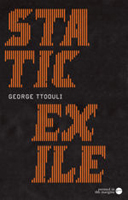The boundaries between mediums are not safe; not only does Static Exile come with 'DVD Extras' at the back of the book but George Ttoouli himself, like the classic Megadrive game Alien Soldier, clearly has an easy and a hard mode. The poems in this ambitious debut collection that come under the 'easy' setting are playful, knowing and a great deal of fun. 'Ghosts' works a very simple premise without squeezing it dry and contains a winning metatextual stanza:
I found a line in one ghost's poem that read,
You can't take the kampongs out
of the people, and to me it sounded
defiant, but later I learned what it meant.
'This Poem All the Time' is a little more heavy-handed but utilises a carefully understated voice in its pursuit of affable post-modern charm, while the title poem, in direct contrast, is a runaway monster. Appropriately so; it's about a runaway monster - either 21st century makeover Godzilla or rampant press hysteria and the proliferation of Michael Bayism in mass entertainment, depending on whether you're reading it literally or looking out for the satirical cues. The monster's last line - "I was born in a snowstorm of English" - reflects back on the construction of the poem, which is packed with all kinds of parodic jabs, structural intertextualism, sneaky nods to pop, gadget and café culture and gleefully critical political commentary. Many of its sections are laid out to look like something between chaotic fleeing-crowd scenes and giant footprints. It's spralling and grandiose, yet easy to grasp.
The title poem [...] is a runaway monster. Appropriately so; it's about a runaway monster - either 21st century makeover Godzilla or rampant press hysteria and the proliferation of Michael Bayism in mass entertainment
There are other poems in the book that capture the same spirit, as well as numerous pieces that see him in investigatory mode, either on the move or stationed in museums and libraries, interrogating the scene for all its fluctuating detail. I'm less certain, if I'm honest, about Ttoouli on the 'hard' setting. It's positively jarring to go from:
I watch the marshalling of night
in the caves of her silverbirch skin, a gauze
I want to filter through. I turn to the light
of the fire and the nightjar's churring. Despite
the drought of my gaze she stays withdrawn
and tender ...
('Dryad')
- to, within a couple of pages:
Harridan yester-hen, I say:
let the glutted slink earthwards aslant.
So I handed you ashes for cud,
no wholesome in the cracked flats,
the fields shunned and the whimples
fly-stepped, through you, unreasoned,
work a coarse simplitude,
an orison to the barren.
('The Ęgian')
I don't criticise the validity of these poems in their own context - they require more studious attention than I have thus far given them. But they also splinter the personality of the book to no obvious advantage. Fractured, esoteric pieces in the Geoffrey Hill mould are at their most convincing and compelling when one gains the impression that the poet sees no other route to realising their vision. Paul Celan's carefully tended inner world of half-thoughts and after-images would appear contrived were it mixed in with nature sonnets, and so too is it difficult to reconcile some of Ttoouli's more extravagant word-juggling with other poems which are so successfully mainstream, so cunningly connected to the world we recognise.

Dr F sez: STA TIC EX ILE! Mr Ttoouli is surely a fierce journalist in disguise as a poet, for he approaches a great range of suitable topics in his pursuit of answers: extra-terrestrials, geology, stained glass windows, history, agroeconomics ('Aggro-economics', he adds), industrialism and biology. But does he overshadow all this scrupulous study with his huge, bellowing radioactive-dinosaur-as-asylym-seeker poem? Perhaps his wife needs to put the sci-fi DVDs into a locked cabinet in order to unleash his full potential!










